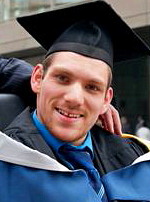 A new drug combination could offer hope to children with neuroblastoma – one of the deadliest forms of childhood cancer – by boosting the effectiveness of a promising new gene-targeted treatment.
A new drug combination could offer hope to children with neuroblastoma – one of the deadliest forms of childhood cancer – by boosting the effectiveness of a promising new gene-targeted treatment.
From ICR press release -
Researchers at The Institute of Cancer Research in London have found a way to overcome the resistance of cancer cells to a drug called crizotinib, which recently showed positive early results in its first trial in children with cancer.
Crizotinib has already been licensed by the US Food and Drug Administration for use in adult cancers, but early experience suggests tumours eventually stop responding to treatment, after developing additional mutations in the ALK gene targeted by the drug.
The paper, led by The Institute of Cancer Research in collaboration with the Dana-Farber Cancer Institute and Children's Hospital in Boston, publishes this week in the prestigious journal Cancer Cell. The study received funding from a variety of sources including The Neuroblastoma Society, Cancer Research UK, Sparks, the children's medical research charity and The Rooney Foundation.
In the study, scientists detailed their new strategy of combining crizotinib with a second class of drugs – mTOR inhibitors – to knock out the resistance of cancer cells.
Scientists identified the strategy after revealing for the first time the role played by the ALK cancer-causing gene in driving neuroblastoma, which accounts for 15 per cent of all the UK's childhood cancer deaths.
Neuroblastomas are cancers of the developing nervous system, and new drug combinations are desperately needed as aggressive forms of the disease are very difficult to treat with conventional chemotherapy.
Senior author Dr Louis Chesler, leader of the neuroblastoma drug development team at The Institute of Cancer Research and honorary consultant at The Royal Marsden NHS Foundation Trust, said: "With the first paediatric clinical trial reporting substantial responses to crizotinib in patients with ALK driven tumours, we are looking for ways to increase the effectiveness of ALK inhibitors in general. We have identified a very promising way to overcome crizotinib resistance in neuroblastoma, by adding a second drug called an mTOR inhibitor. Many mTOR inhibitors are already in adult clinical trials."
"We hope that our work will benefit children with neuroblastoma by increasing the effectiveness of crizotinib. Our study may also have relevance for adult patients with ALK-driven lung cancer and lymphoma who develop resistance to crizotinib, because loss of treatment response in these patients correlates with the development of point mutations in the tyrosine kinase domain of ALK. In children with neuroblastoma these point mutations are in fact the most common primary somatic changes that we see in ALK, so we hope our work with a paediatric cancer will in this case help to unravel resistance mechanisms in adult cancer as well."
Neuroblastoma patients with ALK mutations frequently have alterations to the MYCN gene, which is closely linked to the development of aggressive neuroblastoma but is difficult to target directly with drugs.
The team therefore set out to investigate how a common ALK mutation, ALKF1174L, and alterations in MYCN interact to drive the onset of neuroblastomas, and also to attempt to find a way to overcome resistance to crizotinib.
They found that the ALKF1174L mutation and changes in MYCN cause more aggressive, crizotinib-resistant neuroblastoma, by turning on the PI3K/AKT/mTOR pathway. This pathway has been implicated in the development of neuroblastoma and many adult cancer types, and has been an intense focus of drug-development in adult cancer.
The team found that combining an mTOR inhibitor with crizotinib prevented the growth of neuroblastoma by simultaneously inhibiting MYCN and ALK, overcoming the resistance of these tumours to treatment with crizotinib alone. As well as delivering a strategy to overcome crizotinib resistance in general, this work highlights a treatment approach that may be effective for patients with aggressive neuroblastoma who carry both genetic changes at diagnosis.


 A new drug combination could offer hope to children with neuroblastoma – one of the deadliest forms of childhood cancer – by boosting the effectiveness of a promising new gene-targeted treatment.
A new drug combination could offer hope to children with neuroblastoma – one of the deadliest forms of childhood cancer – by boosting the effectiveness of a promising new gene-targeted treatment. Professor Stephen Hawking was the toast of this year's Technology4Good Awards, winning the Special Award for Excellence in Accessibility from organiser, e-accessibility charity, AbilityNet.
Professor Stephen Hawking was the toast of this year's Technology4Good Awards, winning the Special Award for Excellence in Accessibility from organiser, e-accessibility charity, AbilityNet.  A student with cerebral palsy has urged disabled people to realise they can achieve their ambitions after graduating from the University of Salford on Friday, 20 July.
A student with cerebral palsy has urged disabled people to realise they can achieve their ambitions after graduating from the University of Salford on Friday, 20 July. 